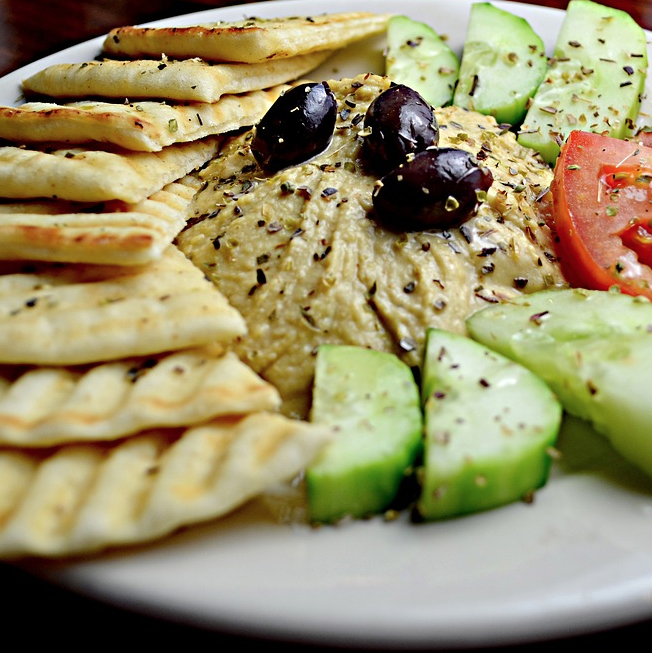
Principles of The Mediterranean Diet | Organic Pharmer
Share
I’m sure you’ve heard of The Mediterranean diet. But as a refresher - it is a healthy eating plan that is based on the traditional cuisines of the countries bordering the Mediterranean Sea. It emphasizes plant-based foods, such as fruits, vegetables, whole grains, legumes, nuts, seeds, herbs and spices. It also includes moderate amounts of fish, seafood, dairy and poultry, and uses olive oil as the main source of fat. Red meat and sweets are eaten only occasionally. The Mediterranean diet has been shown to lower the risk of heart disease and stroke, as well as other chronic diseases.
But what most people typically get wrong are the principles of said diet. Just because olive oil is the main source of fat does not mean we get to have daily fried food in olive oil, or go through a bottle a day. The emphasis of this diet is on plant-based. Plants should be making up the majority of your food leaving all the others as add-ons.

Here are some of the main principles of the Mediterranean diet:
- Focus on eating plenty of fruits and vegetables every day. They are rich in antioxidants, vitamins, minerals and fiber. Aim for at least five servings a day.
- Choose whole grains over refined grains. They provide more nutrients and help regulate blood sugar levels. Examples are whole wheat bread (watch out for preservatives), brown rice, oats, quinoa and barley.
- Include legumes, such as beans, lentils and chickpeas, in your meals. They are high in protein, fiber and phytochemicals that may protect against cancer and diabetes.
- Nuts and seeds are a good source of healthy fats, protein and minerals. They also add crunch and flavor to salads, yogurt and oatmeal. However, they are high in calories, so eat them in moderation. A handful a day is enough.
- Use olive oil instead of butter or margarine in cooking (we say go for avocado oil with cooking) and dressing. Olive oil is rich in monounsaturated fat that lowers bad cholesterol and raises good cholesterol levels. It also contains polyphenols that have anti-inflammatory and antioxidant effects. Pro tip: measure out the olive oil it’s recommended to have only 1-2 tablespoons a day - it’s much less than you think!
- Eat fish and seafood at least twice a week. They provide omega-3 fatty acids that reduce inflammation and prevent blood clots. They also contain protein, iodine, selenium and vitamin D. Choose oily fish, such as salmon, tuna, mackerel, herring and sardines.
- Consume dairy products in low to moderate amounts. They provide calcium, protein and vitamin B12. Opt for low-fat or fat-free milk, yogurt and cheese. You can also have eggs occasionally as a source of protein.
- Limit red meat to once a month. Red meat is high in saturated fat and cholesterol that can raise the risk of heart disease and colon cancer. Choose lean cuts of meat and remove any visible fat before cooking. You can also replace red meat with poultry or plant-based proteins (watch out for preservatives and unhealthy ingredients in plant-based substitutes like impossible burger!)
- Enjoy sweets sparingly. The Mediterranean diet does not forbid desserts, but they should be eaten only on special occasions. Choose fresh fruit or dark chocolate over cakes, cookies and pastries. Avoid added sugars in drinks and processed foods. Note: it’s not a special occasion if the occasion is every night.
- Drink water as your main beverage. Water is essential for hydration and digestion. You can also have coffee or tea in moderation. Avoid sugary drinks, such as soda, juice and sports drinks. Aim for 1/2 your body weight in fl oz daily for water consumption.
- If you drink alcohol, do so in moderation. Wine is often part of the Mediterranean diet, but it should be consumed with meals. This shouldn’t come as a surprise but its definitive - alcohol has no nutritional benefit. Alcohol can have harmful effects on health depending on the amount and frequency.

To give you an idea of what a typical day on the Mediterranean diet looks like, here is a sample menu:
Breakfast: 6 oz (3/4 cup) Greek yogurt with fresh berries and walnuts
Snack: A piece of whole wheat bread with hummus
Lunch: Lentil soup with spinach and whole wheat pita bread
Snack: A handful of almonds
Dinner: Grilled salmon with roasted vegetables and brown rice
Dessert: A slice of watermelon
We can’t help but mention that when looking at the health benefits of the mediterranean diet and thusly the people who reside in blue zones (where the healthiest longest lived people reside) they are mostly making their own food from scratch. So that whole wheat bread is typically homemade, not preservative filled, store bought. Check the ingredients when you are buying foods from the grocery store and use the rule of thumb when looking at ingredient lists: if you don’t know what it is, put it back.
The Mediterranean diet is not only nutritious but also delicious and satisfying. It offers a variety of flavors and textures that can make eating healthy enjoyable. Dr. Mark Hyman, a functional medicine doctor who believes that food is medicine, is an advocate for the Mediterranean diet. He says: "The Mediterranean diet is more than just a diet — it’s a lifestyle that promotes longevity by reducing inflammation throughout your body." He also adds: "The Mediterranean diet is the best diet to follow because it’s easy to stick to long-term — it’s not restrictive or boring."
Remember food is medicine, take it one step at a time, small incremental changes add up to huge life changing rewards.
Want more on the Mediterranean diet? Check out Lisa Malin's article here!
______________________________________
Have you heard about our Phast Program? It's recommended you perform it 3 months in a row and when not on the 5 day set program you should follow the Mediterranean diet!

